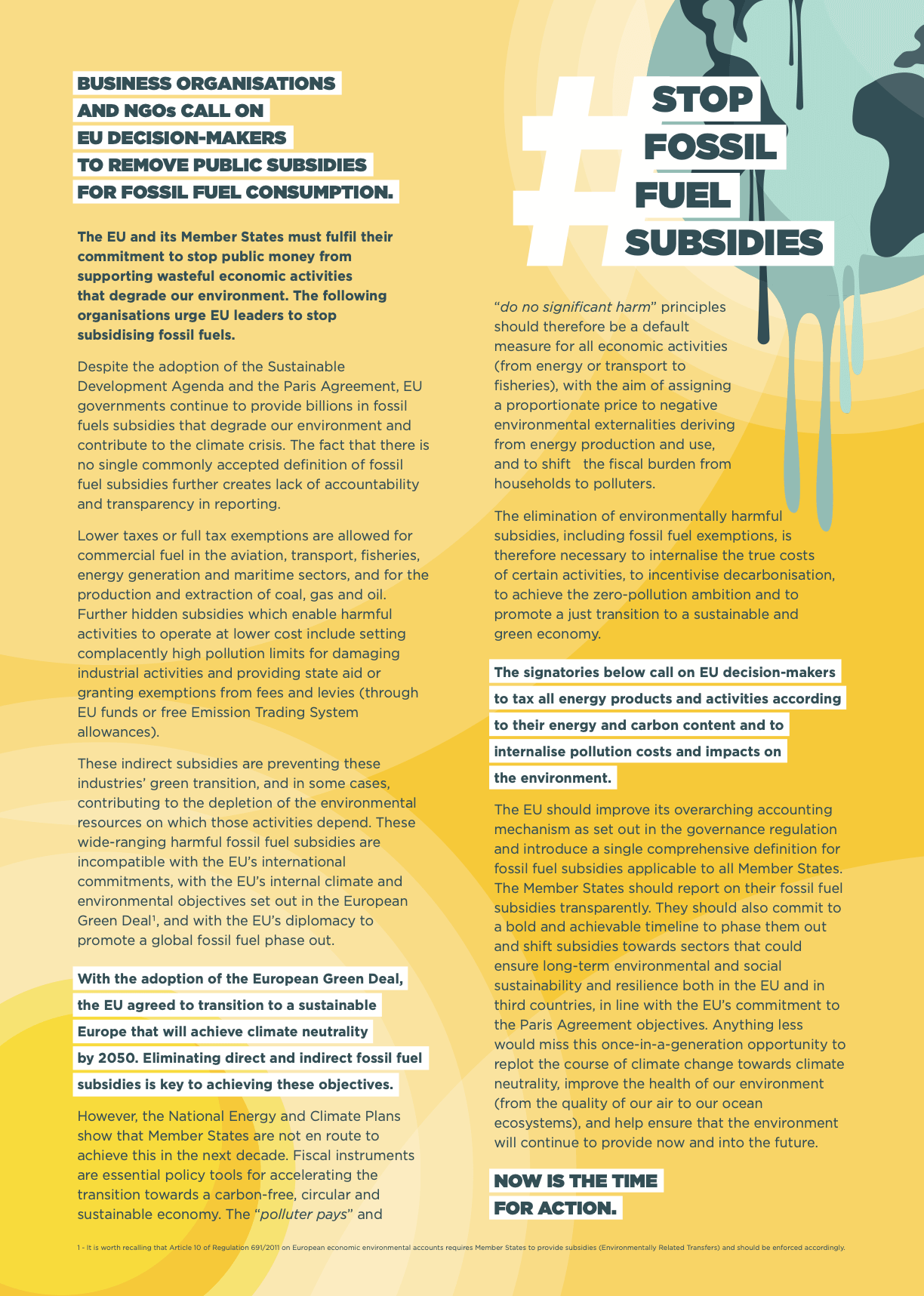The EU and its Member States must fulfil their commitment to stop public money from supporting wasteful economic activities that degrade our environment. We urge EU leaders to stop subsidizing fossil fuels.
Despite the adoption of the Sustainable Development Agenda and the Paris Agreement, EU governments continue to provide billions of fossil fuels subsidies that degrade our environment and contribute to the climate crisis. The fact that there is no single commonly accepted definition of fossil fuel subsidies further creates lack of accountability and transparency in reporting.
Lower taxes or full tax exemptions are allowed for commercial fuel in the aviation, transport, fisheries, energy generation and maritime sectors, and for the production and extraction of coal, gas and oil.
Further complacent attitudes when setting pollution limits for damaging industrial activities, providing state aid or granting exemption from fees and levies (through EU funds or free Emission Trading System allowances) are disguised hidden subsidies which enable harmful activities to operate at lower cost.
These indirect subsidies are preventing these industries’ green transition, and in some cases, contributing to the depletion of the environmental resources on which those activities depend upon. These wide range of harmful fossil fuel subsidies are incompatible with EU’s international commitments and with the internal EU climate and environmental objectives set out in the European Green Deal[1], as well as EU’s diplomacy to promote a global fossil fuel phase out.
With the adoption of the European Green Deal, the EU agreed to transition to a sustainable Europe that will achieve climate neutrality by 2050. Eliminating direct and indirect fossil fuel subsidies is key to achieve these objectives.
However, the National Energy and Climate Plans show that Member States are not en route to achieve this in the next decade. Fiscal instruments are essential policy tools for accelerating the transition towards a carbon-free, circular and sustainable economy. The “polluter pays” and “do no significant harm” principles should therefore be a default measure for all economic activities (from energy or transport to fisheries), with the aim of assigning a proportionate price to environmental negative externalities deriving from energy production and use, and to shift the fiscal burden from households to polluters.
The elimination of environmentally harmful subsidies, including fossil fuels exemptions, is therefore a necessary action to internalise the true costs of certain activities, incentivise decarbonisation, achieve the zero-pollution ambition and promote a just transition to a sustainable and green economy.
The below signatories call on the EU decision makers to tax all energy products and activities according to their energy and carbon content and to internalise pollution costs and impacts on the environment.
The EU should improve its overarching accounting mechanism as set out in the governance regulation and introduce a single comprehensive definition for fossil fuel subsidies applicable to all Member States.
The Member States should transparently report on their fossil fuel subsidies and commit to a bold and achievable timeline to phase them out and shift subsidies towards sectors that could ensure long-term environmental and social sustainability, resilience both in the EU and in third countries, in line with the EU’s commitment to the Paris Agreement objectives. Anything less would miss this once-in-a-generation opportunity to replot the course of climate change towards climate neutrality, improve the health of our environment, from the quality of our air to our ocean ecosystems, and help ensure that the environment will continue to provide now and into the future.
Now is the time for action.
[1] It is worth recalling that Article 10 of Regulation 691/2011 on European economic environmental accounts does require Member States to provide subsidies (Environmentally Related Transfers) and should be enforced accordingly


